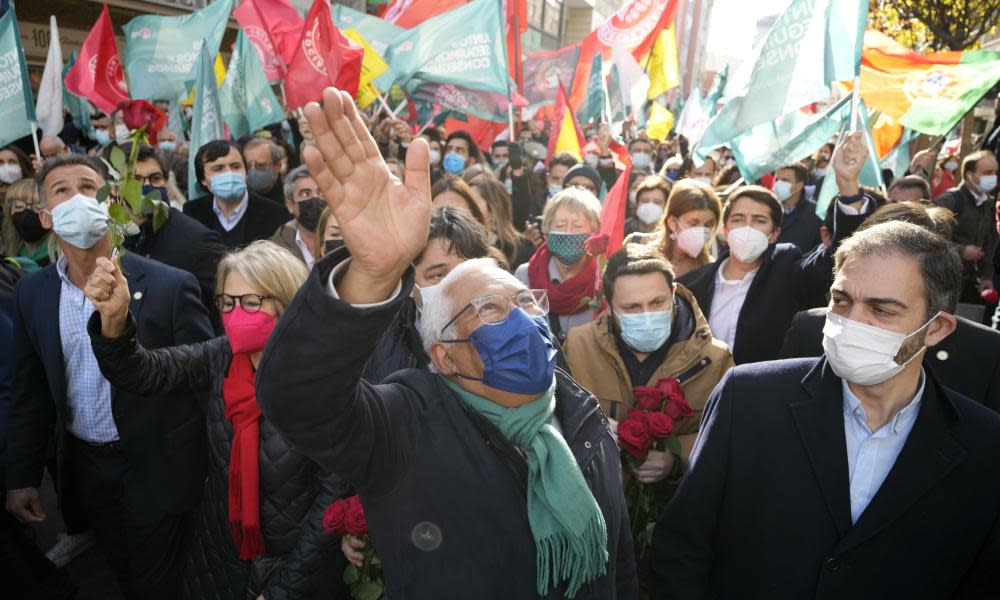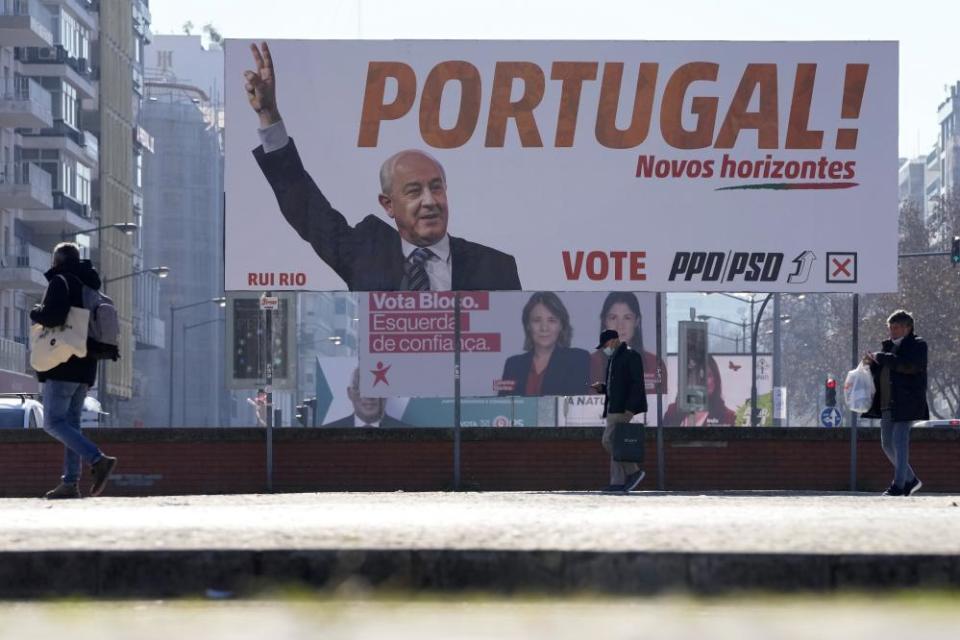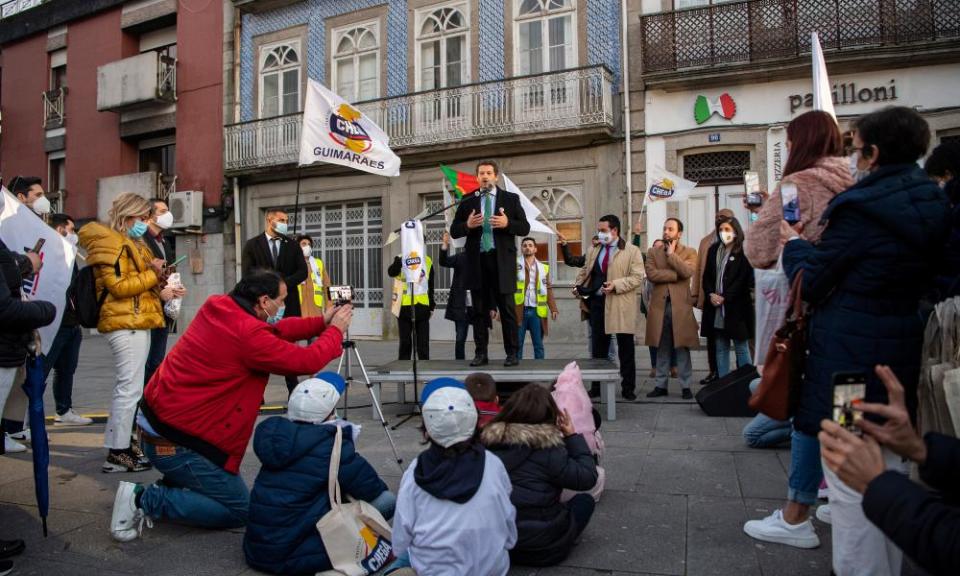Splits in left are set to boost far-right TV pundit in Portugal’s snap election

Between greeting regulars at the busy Lisbon bakery where she has worked for two decades – and reaching instinctively for their orders as soon as they cross the threshold – Susana Santos offers her thoughts on an imminent, and altogether less welcome, encounter.
Like many of her compatriots, she does not relish the idea of Sunday’s snap general election, which arrives amid a stubbornly lingering pandemic and during a time of economic upheaval and political uncertainty.
“They should have left things as they were. That would have been best,” says Santos, 48. “I’m exhausted. I’m tired of all this. What they’re doing is a joke.”
The early election was triggered last December after the fragile, but improbably durable, deal between Prime Minister António Costa’s minority Socialist government and its allies in the Portuguese Communist party and the Left Bloc broke down during negotiations to pass the 2022 budget.
Related: Portugal faces snap election as parliament rejects draft budget
After weeks of tense negotiations, the Communists and Left Bloc eventually joined rightwing parties in rejecting the budget bill. Not only did the surprise rupture end the alliance known as the geringonça – or improvised solution – which had made Portugal a rare beacon of European social democracy, it also yielded an election that could see the far-right Chega party become the third biggest group in parliament.
For Santos and for many others, the timing could not be worse. The early election will delay the approval of a new spending programme, just as the government was poised to jump-start the economy after the pandemic with €45bn (£38bn) in EU recovery funds.
Since 2015, Costa’s administration has led an economic turnaround, reversing unpopular austerity measures, such as the cuts to public sector wages and pensions introduced during the European financial crisis. Last year, the government received praise for spearheading one of the most successful vaccination programmes in Europe and bringing unemployment to pre-pandemic levels.
The Socialists’ track record is likely to ensure loyalty from voters such as Santos. “I’ll vote for the Socialists because I don’t earn much,” she says. “They didn’t take our subsidies or anything, so it wasn’t bad – but it hasn’t been easy.”

Others are more despondent. Armando Mendes, a 68-year-old retired teacher who now works as a private tutor, is disappointed that the election has come two years early, and pessimistic about the chances of an effective government.
“I’ve never failed to vote, but I think this is a clown-show,” he says. “They’re playing games – nothing justifies this.” For Mendes, the main priorities of the next government should be strengthening the national health service – which is still reeling from the pandemic – and investing in improving the school system.
He is not enthused by the prospect of another geringonça: “I don’t think any government elected without a majority will manage to get anything done.”
Although the polls have shown a close race for first place between Costa’s Socialists and the centre-right Social Democrats (PSD), the latter appears to be pulling ahead. A poll released on Tuesday put support for the PSD on 34.4% – up from 28.5% a week earlier – and backing for the Socialists at 33.8%, down from 38.1%.
The PSD, which is led by the economist Rui Rio, has pledged to cut taxes on corporate profits and personal income, should it emerge victorious.
“We have to reinforce the competitiveness of our economy,” Rio said at the beginning of January. “We have to turn our economic policy towards companies because they are the ones that create better wages and better jobs.”
Costa, meanwhile, has denounced his former allies in the Left Bloc and Communist party as “irresponsible” for torpedoing his budget, and is urging voters to give him an outright majority so the Socialists can govern alone.
However, neither the Socialists nor the PSD look to be on course for an overall majority, meaning that deals will have to be struck and alliances forged by whichever party wins the most votes.
The same poll that gave the PSD the lead also suggested that the far-right Chega could leapfrog the Left Bloc to become the third largest force in parliament. Chega, which is led by the belligerent former TV football pundit, André Ventura, won a seat in the 2019 general election, taking 1.3% of the vote.

But when Ventura – an ally of Marine Le Pen of France and Italy’s Matteo Salvini who has repeatedly sought to demonise Portugal’s Roma community – ran in the 2021 presidential election, he attracted 11.9% of the vote.
Pedro Magalhães, a political scientist at the University of Lisbon’s Institute of Social Sciences, says Chega will almost certainly consolidate its presence in parliament and could even win 10 seats, thanks to a populist strategy complete with some familiar enemies.
“They’ve plugged into attitudes that are either deep-seated in Portugal – prejudice against Gypsies, the perception that the entire political class is totally corrupt – or that, although they may not be widespread, are nevertheless prevalent enough to make a difference: the notions that social transfers go to the ones who least deserve it or that immigration is a threat.
What scares me the most is the prospect of a right-wing majority, with the far-right included
Miguel Ameixas, student
“They have a solid presence in social media, good mobilisation, and the beginnings of a true party structure,” he says. “Having said that, whether they can form a parliamentary group of MPs with minimal quality and effectiveness is going to be a major test of their growth as a party.”
While Rio has ruled out including Chega in any coalition, the far-right party could still play a big role in shaping and propping up a PSD government. Across the border in Spain, the far-right Vox party has proved crucial to the formation of three rightwing regional governments and is the third biggest party in the national parliament.
For many voters, the idea of a powerful far right in a country that is fiercely proud of reinventing itself after the end of the Salazar dictatorship is deeply troubling.
Miguel Ameixas, a mechanical engineering student in Lisbon, is still weighing up his vote.
“What scares me the most is the prospect of a rightwing majority, with the far right included,” he says.

 Yahoo Movies
Yahoo Movies 
